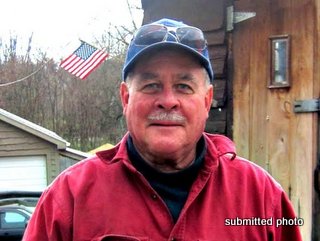Q&A: Williamstown's Transfer Station Manager Retires

Paul Langlois has been operating the town's transfer station for 26 years. His last day was Wednesday. |
WILLIAMSTOWN, Mass. — Paul Langlois is a people person, and he has found his share of treasure helping his fellow town residents dispose of their trash.
After more than a quarter century supervising the town's landfill-turned-transfer station, Langlois served his last shift on Wednesday.
In an email to iBerkshires.com calling attention to Langlois' service, his friend Harry Montgomery described him as a "local fixture" who ran the facility "with a combination of authority, tact and hands-on help when needed."
During a lull at the facility on Wednesday morning, Langlois took a few moments to reflect on his years of service.
Q: Did you think when you started here 26 years ago that you'd still be doing it this many years later?
Answer: Actually, when I was hired by Rich McFadden, I told him that I could probably give the town 15 to 20 good years. It ended up being 26.
Q: So you always saw it as a long-term commitment anyway?
A: Oh, yeah. I was here for the duration.
Q: What kinds of changes have you seen at the facility over the years?
A: We started out as the landfill, as you probably know. Then we went to another phase where we turned it into a transfer station. ... That was quite a few years ago.
[The landfill] was about half full when I got here in 1986.
Q: How about changes in how materials are handled when they come in?
A: There have been a lot of changes over the years. It as a gradual thing. The state started the transfer station business. They set up a transfer station in Springfield and set the rules for how it would be done. After they set it all up and set up all the towns, they turned it over to the commercial haulers. Originally it was the state that got involved. And they're still involved. Everything we do is mandated by the state.
A guy by the name of Mike Pattavina (from the state), he set it up. He told us where the paper container would be, how many cubic yards, where the glass and cans were going to be set up. They set up everything for us. That's how it originally started.
Q: Are people generally good about following the rules on what to put where?
A: People are excellent. They've been very, very good as far as being environmentally conscious of how to recycle and what numbers to recycle, that kind of thing. They've been very helpful. They've made my job easier.
Q: What's the hardest part of the job? Is it the smell?
A: No. That's just part of the job.
I think the toughest part of the job is trying to anticipate when a container needs to be shipped. You have a 24-hour time limit that you need to call for a container, and sometimes you don't know how many people are going to come in that day. It's a judgment thing. After a while, if you pay attention, you tend to get a feel for it. But still you don't always make the right decision on that."
Q: What's the best part of the job?
A: Best part of the job is the people. It's great to listen to all the different comments and personalities. It's just very inspiring.
Q: Ever find anything unusual that someone has discarded?
A: When you're dealing with the public, there's a lot of things that you don't expect. But it's just part of the job."
Q: Anything that stands out?
A: I don't know. There's been things but nothing jumps out. I did have an incident one time where a gentleman had a TV. This was years ago, and at the time we had a metal container down there, and that's where they went. I told him to put it in the metal container. And he didn't know so he came up here and saw the container for glass and cans and threw it in there. So I retrieved it out of there.
Sometimes things like that happen.
Q: Ever find anything valuable?
A: There are people who donate items. They're moving out of town and don't want to take things with them so they'll leave them here. And there are also people who are looking for things. So it kind of works out. We don't exactly have a 'swap shop,' per se. But it seems to work out that way because anything people can use, I certainly allow them to help themselves. That's how material gets moved around and recycled."
Q: Glad to be getting out before the winter?
A: That was in the plan. I started a couple of years ago working on this. Winters can be tough. You don't know what nature's going to throw at you. So I decided after last year being a mild winter this would be a good time to leave before another winter sets in.
Q: What's next for you?
A: I'm going on vacation, and I'm really treating [retirement] like vacation for a while before it wears off and reality sets in. As far as plans, I don't really know yet. I'm just going to let the cards fall where they may and enjoy my freedom and my ability to do things that I wouldn't be able to do otherwise.
Tags: Q&A , retirement, transfer station,

